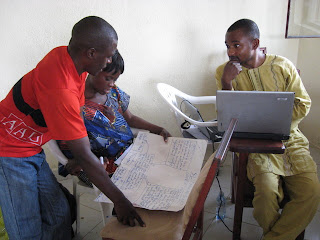LEARNING BY DOING IN THE TODAY’S CONTEXT: SERVICE LEARNING AND GLOBALIZATION
La mondialisation étant un processus au cours duquel le monde est entrain de se réduire en un village planétaire, pas de raison pour y échapper. La mondialisation est entrain de s’imposer à pas de géant sous son engin le plus puissant, la technologie. Celle-ci à son tour évolue à une vitesse vertigineuse. Ce n’est pas tout, <<à toute action correspond une réaction>>, dit Isaac Newton. La mondialisation et se régie par la relation réciproque du rendez-vous du donner et du recevoir sous forme multidimensionnelle au cours duquel toutes les nations du monde, chacune avec sa part, se présentent à la table des nations pour le bien commun. En particulier, lorsqu’il s’agit des cultures qui se rencontrent, nous parlons de l’acculturation.
Dans plusieurs parties du monde, cette dernière est mal accueillie juste parce qu’il n’existe pas une compréhension effective de l’acculturation ; d’où, de la mondialisation elle-même. Ici, il ne s’agit pas simplement de copier à l’aveuglette la culture et les pratiques étrangères, mais plutôt, avec tout discernement, de prendre ce qui est de bon chez autrui pour le mélanger avec ce que l’on a de bon tout en gardant son identité et son originalité intactes.
A force de se sous-estimer, d’autres ne font que décalquer les pratiques étrangères sans autant même qu’ils aient compris le fond fin de ces pratiques. Ceci ne fait qu’handicaper le rendez-vous du donner et du recevoir, vu que le donner n’existe quasiment plus. Dieu, le Grand Créateur, nous a créés chacun avec ses spécificités, ce qui implique aussi que chacun a ses capacités, ses qualités, ses aptitudes, ses potentialités. Personne ne peut se permettre de déclarer tout haut que lui n’en dispose pas car cela risque de faire preuve d’une ingratitude à outrance et cela ne fairait jamais plaisir à Dieu!!!
Voici déjà que la création a un caractère général, l’unité dans la diversité. En titre d’illustration, considérons la nature humaine. Chaque être humain détient sa propre configuration de la séquence dans la chaine d’ADN, mais nous cohabitons ensemble sans discrimination. Il en est de même pour les contraintes de développement. Certaines régions sont dans un climat chaud, et d’autres dans un froid ; certaines régions sont en scandale géologique, tandis que d’autres ne possèdent pas grand-chose ; certaines régions possèdent un sol considérablement fertile, alors que d’autres régions en possèdent un sol pauvre en matières natives pour la fertilité. Et la liste ne fait que continuer.
C’est ici que le Service-Learning ou l’apprentissage s’impose. En servant la communauté, nous parviendrons à comprendre ses atouts et défis tout en cherchant à comment les transformer en opportunités. D’ailleurs, parlant Service-Learning, c’est la communauté qui devient enseignant des apprenants. Ainsi, même dans leurs recherches, les apprenants ne se focaliseront leurs recherches que sur la communauté pour envisager des conditions nouvelles pouvant amener la communauté à connaitre une reforme irredoutable, un développement durable, ainsi qu’à la transformation. A chacun de nous d’agir.
By REGIS Mathe HENRY



















